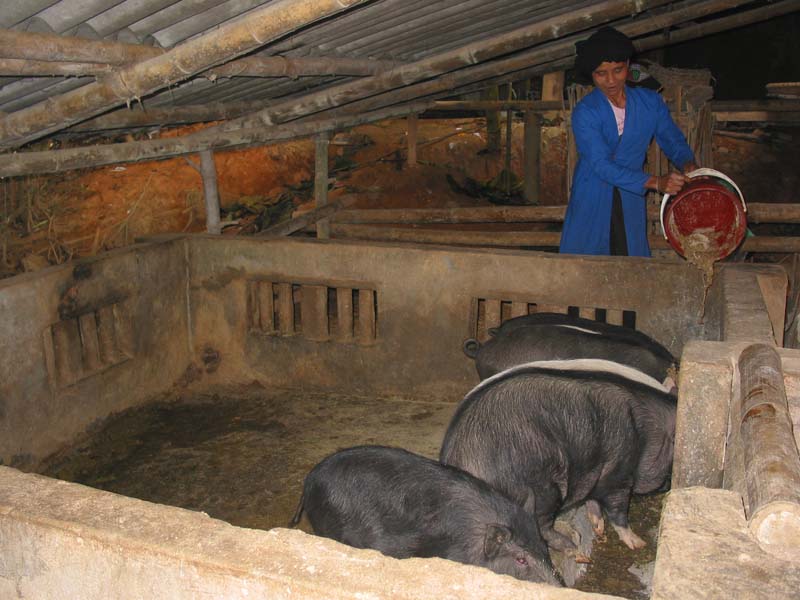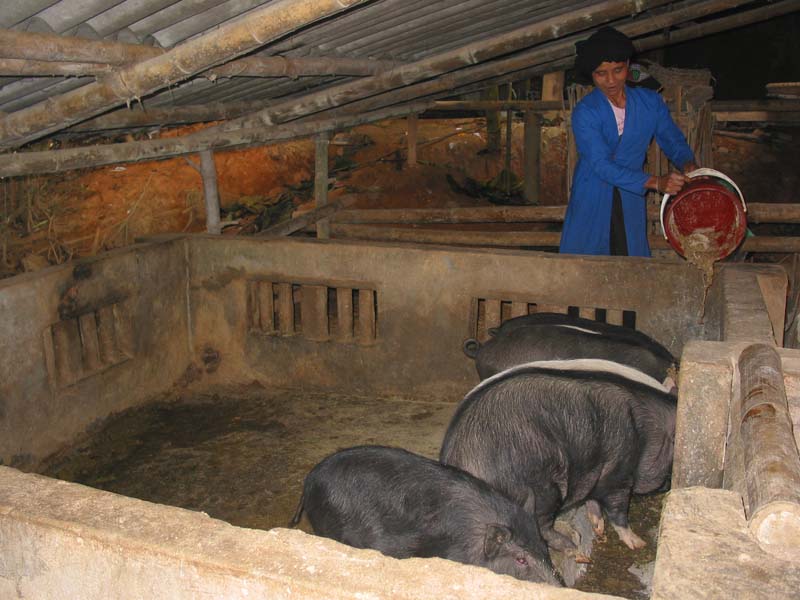
(HBO) - Indigenous Pigs are one of the special famous livestock of Da Bac highland district.

The pig raising family of Muong Chieng
Commune (Da Bac) manages the Indigenous pig herds at the cages to protect from
the diseases.
With more than 16,000 pigs, the local
indigenous pig population in the district accounts for more than 50% of the
total population of the province. Pig breeders are mainly ethnic minorities of
Muong and Dao ethnic groups. There is a fact that the habit of raising
indigenous pigs popularly has led to uncontrolled diseases. In addition, the
risk of genetic loss due to crossbreeding, crossbreeding among other pig
species, inbreeding quality, and near blood inbreeding, a decrease in the
number of originally indigenous pigs at the time of the survey before 2014 was
at at the urgent level. One of the objectives of the Project is to make
changes, change the method of old livestock raising to managed livestock
raising.
The 6 selected communes were Tan Pheo, Giap
Dat, Muong Chieng, Cao Son, Doan Ket and Hien Luong, propaganda and
dissemination activities together with technical training on animal husbandry,
care and disease prevention for indigenous pigs to the vet staff of the
communes have been implemented to support the farming households for actively
deploying. In particular, each commune has formed a group of indigenous pig
breeding. Since April of 2018, the Project has provided initial support to the
activities of cooperative groups. Specifically, they assisted in buying and
handing sows and male pigs of breeding directly to 90 households participating
in the model, each household had 2 sows, each cooperative group had a male pig.
The delivered pigs were purchased from local indigenous pig producers in the
area with careful selection and healthy, disease-free, ready for breeding.
According to data from the Hoa Binh Provincial Party Committee, the industrial production index for the first six months of 2025 is estimated to have increased by 20% compared to the same period last year. This marks the highest year-on-year growth rate for this period since 2020.
In the first six months of 2025, Hoa Binh province’s export turnover was estimated at 1.145 billion USD, marking an 18.11% increase compared to the same period in 2024. Import turnover was estimated at $ 804 million, a 17.15% increase, which helped the province maintain a positive trade balance.
The lives of the ethnic minority farmers in Tan Lac district have gradually improved thanks to the new directions in agricultural production. This is a testament to the collective strength fostered through the professional associations and groups implemented by various levels of the district’s Farmers’ Union.
With the motto the "product quality comes first,” after nearly one year of establishment and operation, Muong village’s Clean Food Agricultural and Commercial Cooperative, located in Cau Hamlet, Hung Son Commune (Kim Boi district), has launched reputable, high-quality agricultural products to the market that are well-received by consumers. The products such as Muong village’s pork sausage, salt-cured chicken, and salt-cured pork hocks have gradually carved out a place in the market and they are on the path to obtaining the OCOP certification.
In the past, the phrase "bumper harvest, rock-bottom prices" was a familiar refrain for Vietnamese farmers engaged in fragmented, small-scale agriculture. But today, a new spirit is emerging across rural areas of Hoa Binh province - one of collaboration, organisation, and collective economic models that provide a stable foundation for production.
Maintaining growing area codes and packing facility codes in accordance with regulations is a mandatory requirement for agricultural products to be eligible for export. Recently, the Department of Agriculture and Environment of Hoa Binh province has intensified technical supervision of designated farming areas and packing facilities to safeguard the "green passport" that enables its products to access international markets.



